(houseofbhakti.com) – Ultimately Prema Cannot Be Described
from Chapter 12 of the book, Going Beyond Vaikuṇṭha, 4th edition by Śrīla Bhaktivedānta Nārāyaṇa Mahārāja
Whenever we hear hari-kathā, we should listen with our hearts, and be sure to keep it in our hearts. Otherwise, the ear will hear, but the ear will not tell the heart, and it shouldn’t be like that. What is told to our ears should arrive in our hearts, and we should try to bring that into practice. Then we will get the result of hearing. If we are not able to hear hari-kathā properly and not able to keep it in our hearts, then the spiritual greed that should arise from hearing such talks will not arise within us in this or in any other birth.
Śrīla Bhaktisiddhānta Sarasvatī Prabhupāda said that this world is deficient. This body is also deficient; everything here is deficient. But whatever we are undergoing in this world now, and whatever deficiencies there are, our aim is not to make them go away. We should not try for that in life. They will remain now, and they will remain for millions of years. What is the true purpose of human life – that should be ascertained in this lifetime. What is the aim of life? What should we do? This human birth is very valuable, because with it we can meet Bhagavān. We should definitely try for this in this very lifetime, and our goal should be ascertained before we are forty years of age. Generally, we see that after the age of forty one’s desire and ability to take a new course in life is diminished. We may try to apply our minds to something new and then after some time our determination may fade and not return. Although it is certainly possible to change direction in life after the age of forty – and many have done it – the risk is there that one will become ‘set in his ways’. So whatever situation you are in now as youths, at a tender age, you should put into practice the ideals that will lead to the goal of human life. Then the final result may come within a relatively short time or a very long time; that is a separate consideration. But your present age is very valuable. Therefore certainly before the age of forty a person should make the decision to fulfil the aim of human life. Because after that the age of fifty comes, and then there is an even greater chance that it will be too late. At that time, we may hear everything, but still never muster the firm determination to do what should be done.
In the name Gopa-kumāra, what is the meaning of kumāra? He is at a very tender age, and he met his guru at that age. Even after millions of years, when he finally received such mercy that he met Bhagavān, he still remained as a kumāra. From the day of meeting his guru he slowly came to understand siddhānta and became 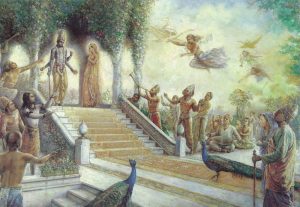 determined. He never abandoned the chanting of his gopāla-mantra. Wherever he went he kept the same determination, and he never changed his aim. We should follow that example. If our aim remains correct, then Kṛṣṇa in the form of the spiritual master, in the form of a Vaiṣṇava, in the form of the śikṣā-guru, and in other forms also, will give us help in the midst of our progress and send others to help us as well. Who sent Nārada to Gopa-kumāra? He met Nārada in Vaikuṇṭha, and Bhagavān as the Supersoul helps devotees in this way so that they can attain the goal of life. One who instructs us on how to attain Bhagavān is guru. For this purpose Nārada is wandering throughout the world, and it is through such a devotee that Bhagavān can help us.
determined. He never abandoned the chanting of his gopāla-mantra. Wherever he went he kept the same determination, and he never changed his aim. We should follow that example. If our aim remains correct, then Kṛṣṇa in the form of the spiritual master, in the form of a Vaiṣṇava, in the form of the śikṣā-guru, and in other forms also, will give us help in the midst of our progress and send others to help us as well. Who sent Nārada to Gopa-kumāra? He met Nārada in Vaikuṇṭha, and Bhagavān as the Supersoul helps devotees in this way so that they can attain the goal of life. One who instructs us on how to attain Bhagavān is guru. For this purpose Nārada is wandering throughout the world, and it is through such a devotee that Bhagavān can help us.
Bhagavān is like a father and jagad-guru. The initiating spiritual master (dīkṣā-guru) is also jagad-guru and like a 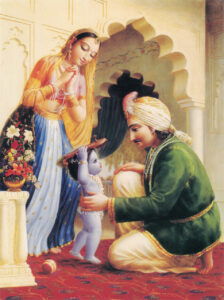 father, but a father will not instruct his daughter on how to serve her husband. He will not tell her how she is to behave when alone with her husband. Her mother will also not say. Who will say? Her close friend will be able to tell her. The example is also there that Kṛṣṇacandra is the beloved son of Nanda Bābā, and Nanda Bābā’s younger brother is Sunanda. Though living with both of them, Kṛṣṇa is more affectionate with Sunanda. In the scriptures it has been described that He associates more with Sunanda. Sunanda is somewhat older than Kṛṣṇa, but he is Nanda’s youngest brother. Therefore he is Kṛṣṇa’s dear friend and like His father also. He can fight and quarrel with Kṛṣṇa too, but when Kṛṣṇa wants His father to agree to something, He approaches Sunanda, and Sunanda makes Nanda Bābā agree to it. He is very intimate with Kṛṣṇa.
father, but a father will not instruct his daughter on how to serve her husband. He will not tell her how she is to behave when alone with her husband. Her mother will also not say. Who will say? Her close friend will be able to tell her. The example is also there that Kṛṣṇacandra is the beloved son of Nanda Bābā, and Nanda Bābā’s younger brother is Sunanda. Though living with both of them, Kṛṣṇa is more affectionate with Sunanda. In the scriptures it has been described that He associates more with Sunanda. Sunanda is somewhat older than Kṛṣṇa, but he is Nanda’s youngest brother. Therefore he is Kṛṣṇa’s dear friend and like His father also. He can fight and quarrel with Kṛṣṇa too, but when Kṛṣṇa wants His father to agree to something, He approaches Sunanda, and Sunanda makes Nanda Bābā agree to it. He is very intimate with Kṛṣṇa.
Similarly, like a father, Bhagavān Himself will give us less instruction, but He will give it. In another form He will give it in great detail by sending someone who is dear to Him and that person will tell us everything. In the form of the instructing spiritual master (śikṣā-guru), Bhagavān will tell one everything. Nārada, as the śikṣā-guru of Gopa-kumāra, will tell him things that Jayanta, Gopa-kumāra’s dīkṣā-guru, would not tell him. Just as the greatness of the dīkṣā-guru has been described, in the same way the glories of the śikṣā-guru have also been described in Śrī Caitanya-caritāmṛta and other scriptures.
There is some separation, vipralambha-bhāva, in devotees’ love. It is such a peculiar sentiment that only premī, 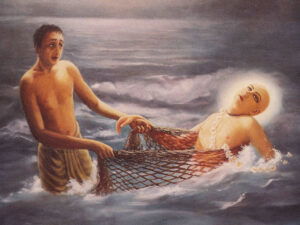 or loving, devotees can know it. Others cannot understand it, and upon seeing it, they even become frightened. In Purī, Mahāprabhu jumped into the ocean thinking that it was the Yamunā. A fisherman, taking his net, climbed into his boat and went out onto the ocean. Mahāprabhu’s body appeared as if He had not eaten for a long time, and in this weak and fragile condition He entered into the fisherman’s net. When the fisherman was drawing in his net, he felt the heavy weight and joyfully thought, “Today I have caught a big fish.” Bringing the net into the boat, he returned to the shore. There, when he looked closer, he became frightened and thought, “What is this? A corpse has come into my net!” Having touched Mahāprabhu’s body, the fisherman felt that a ghost had possessed him. Becoming overwhelmed with fear, he left his net and everything there and ran away.
or loving, devotees can know it. Others cannot understand it, and upon seeing it, they even become frightened. In Purī, Mahāprabhu jumped into the ocean thinking that it was the Yamunā. A fisherman, taking his net, climbed into his boat and went out onto the ocean. Mahāprabhu’s body appeared as if He had not eaten for a long time, and in this weak and fragile condition He entered into the fisherman’s net. When the fisherman was drawing in his net, he felt the heavy weight and joyfully thought, “Today I have caught a big fish.” Bringing the net into the boat, he returned to the shore. There, when he looked closer, he became frightened and thought, “What is this? A corpse has come into my net!” Having touched Mahāprabhu’s body, the fisherman felt that a ghost had possessed him. Becoming overwhelmed with fear, he left his net and everything there and ran away.
Nearby, Svarūpa Dāmodara, Rāya Rāmānanda, Nityānanda Prabhu, Advaita Ācārya and all the devotees were searching for Mahāprabhu. They saw a madman on the shore of the ocean who was laughing, crying and calling out, “Hari! Hari!”
Svarūpa Dāmodara said to him, “What happened? ”
The fisherman said, “A ghost has possessed me!”
Recognising the man’s symptoms, Svarūpa Dāmodara said, “I know how to rid you of this ghost; I know the mantra.” He slapped the fisherman a few times, recited a mantra, and then the fisherman came to his senses a bit. Then he said, “My friend, can you show us where you have seen this ghost?”
“From a distance I will show you, but I will not go near there!” “All right.”
Going to the place, from a distance the fisherman showed them. There in the net was Mahāprabhu, His body rolled into a ball in the posture of a child before birth. His joints were all dislocated, and His whole body was slack and elongated. Then Svarūpa Dāmodara told the fisherman, “Okay, you can go now and this ‘ghost’ will no longer disturb you.” Then the devotees took Mahāprabhu out of the net, laid Him on the shore, and cleaned off His body. Surrounding Him, they started performing kīrtana, and after a little while Mahāprabhu came to His senses.
Seeing Mahāprabhu’s condition, that fisherman became terrified. Like this, if any ordinary man sees such an advanced state of bhakti, will he desire bhakti? But loving devotees will understand. They will think, “When, in my meditation, will I also be able to have such a darśana of Kṛṣṇa as Mahāprabhu was experiencing? When will I receive such an opportunity?”
A devotee has to go through this intense separation to reach Kṛṣṇa. It is like the unhappiness of this world 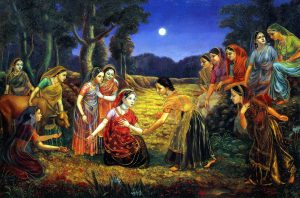 multiplied millions of times, and a devotee will have to feel that many times. Still, he will not be able to express it in words. Bhagavān Himself is not able to express it. Whoever is experiencing it will be unable to express it in words. Nowhere in the scriptures are the symptoms of premī devotees described completely. In Śrīmad-Bhāgavatam, the symptoms of the gopīs’ state of intoxication and mad, senseless speech have only been described in brief; more than that has not been described. It is not possible. But we should understand the unhappiness of Śrīmatī Rādhikā and the gopīs in separation from Kṛṣṇa to be the ultimate transformation of happiness, the very culmination of happiness.
multiplied millions of times, and a devotee will have to feel that many times. Still, he will not be able to express it in words. Bhagavān Himself is not able to express it. Whoever is experiencing it will be unable to express it in words. Nowhere in the scriptures are the symptoms of premī devotees described completely. In Śrīmad-Bhāgavatam, the symptoms of the gopīs’ state of intoxication and mad, senseless speech have only been described in brief; more than that has not been described. It is not possible. But we should understand the unhappiness of Śrīmatī Rādhikā and the gopīs in separation from Kṛṣṇa to be the ultimate transformation of happiness, the very culmination of happiness.
For example, when it is very hot and a few drops of rain begin to fall, it is very pleasant. When the month of Kārttika starts and it begins to cool off, we like that very much. So coolness is welcome, but too much cold is unpleasant, such as when it freezes overnight and ice forms. But although cold and heat are complete opposites, it is an astonishing thing that when one takes a piece of ice in his hand, it feels as if it is burning. This burning sensation is the ultimate transformation of cold.
Similarly, in the realm of bhakti, when kṛṣṇa-prema becomes intensified and one experiences vipralambha, it seems that at that time he is very unhappy, but that is not actually unhappiness. It is the pinnacle of happiness. No one can describe the symptoms of that condition. What were the sentiments of Śrīmatī Rādhikā that Caitanya Mahāprabhu felt when He was locked in the Gambhīrā and was rubbing His face against the wall? The sentiments that were experienced by Rādhikā, the bhāva experienced by Mahāprabhu – has all of this been described? No. Therefore this is called sva-saṁvedya-daśā: it can only be understood by directly experiencing it oneself. It is not possible for anyone to describe it.
We cannot tell anyone about what divine bliss, what ānanda, has come within us as a result of meeting Kṛṣṇa.
Therefore, Nārada told Gopa-kumāra, “My dear friend, this desire to meet Kṛṣṇa which has arisen inside you by 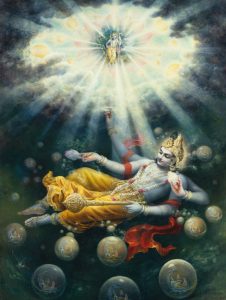 the influence of your mantra – this is sva-saṁvedya-daśā. With mere words I cannot make you understand completely this matter that has disturbed you, but I will try to describe it a little. The nature of prema is like that. That desire for the prema of your internal identity (svarūpa) can never be fulfilled here. That svarūpa is in sakhya-bhāva, and beyond that, pure viśrambha, or intimate, sakhya-bhāva. This viśrambha-sakhya-bhāva cannot be found in any place from Siddhaloka to Sadāśivaloka to Vaikuṇṭha, Ayodhyā, Mathurā or Dvārakā. It is found only in Vraja.”
the influence of your mantra – this is sva-saṁvedya-daśā. With mere words I cannot make you understand completely this matter that has disturbed you, but I will try to describe it a little. The nature of prema is like that. That desire for the prema of your internal identity (svarūpa) can never be fulfilled here. That svarūpa is in sakhya-bhāva, and beyond that, pure viśrambha, or intimate, sakhya-bhāva. This viśrambha-sakhya-bhāva cannot be found in any place from Siddhaloka to Sadāśivaloka to Vaikuṇṭha, Ayodhyā, Mathurā or Dvārakā. It is found only in Vraja.”
Then Nārada glanced around; Lakṣmī-devī was nowhere near, and no other eternal associates of Nārāyaṇa were around, so no one was listening to this conversation. If someone with a particular sentiment hears the words of someone with a higher sentiment, they will say something like, “Oh, he is blaspheming our Lord!” Therefore not everyone should hear such talks. That is why Nārada checked to ensure that no servant or friend of Lakṣmī, or Garuḍa, or anyone else was nearby. Then, after looking, he began speaking again. “Inside you there is so much bhakti. You can easily have heavenly enjoyment or liberation. You can even have the prema of Vaikuṇṭha, but the love for Śrī Rādhā and Kṛṣṇa that you are seeking is so difficult to obtain, so rare. By performing the appropriate sacrifice, you can attain residence in the heavenly planets, liberation, or even Vaikuṇṭha. By following the path of jñāna you can achieve liberation, and by way of karma-yoga you can go to heaven. But the bhakti that you desire cannot so easily be attained, even by millions of efforts. You will never obtain it by your own endeavour, so how will you receive it? Only if you unconditionally surrender to Śrī Rādhā-Kṛṣṇa and beg mercy from Them – then it may be possible. Our ‘effort’ is to pray for it. Our only prayer is that we can somehow offer Them our very soul. But trying to obtain this prema by our own effort? It is not possible. What you desire is very rare. It is obtainable – not that you can’t get it, you can obtain it – but it is very difficult.”
kadācid eva kasmaicit
tad-ekārtha-spṛhāvate
taṁ dadyād bhagavān bhaktiṁ
loka-bāhyāya dhīmate
Bṛhad-bhāgavatāmṛta (2.4.233)
If someone desires the prema of Vraja, then only if real spiritual greed has somehow or other arisen within them will they be able to obtain it. Without this greed it will never be possible. When a person really wants something, then by bribery, by thievery, by trickery, by fighting – by any means they will try to get it, and this greed is the root cause of prema-bhakti. Such transcendental greed is possible only when Bhagavān and His premī, rasika devotees are merciful to us. Kṛṣṇa will give the highest treasure only to those who have some special hankering for it and not to those who don’t have this qualification.
What shape will this hankering take? “I want to serve Kṛṣṇa just as Subala does, or just as Madhumaṅgala, Śrīdāmā and others do.” Is it possible that there is any special difference between the service of Śrīdāmā and the service of Subala? A very big difference is possible. Śrīdāmā has great love for Kṛṣṇa; as much as Subala or 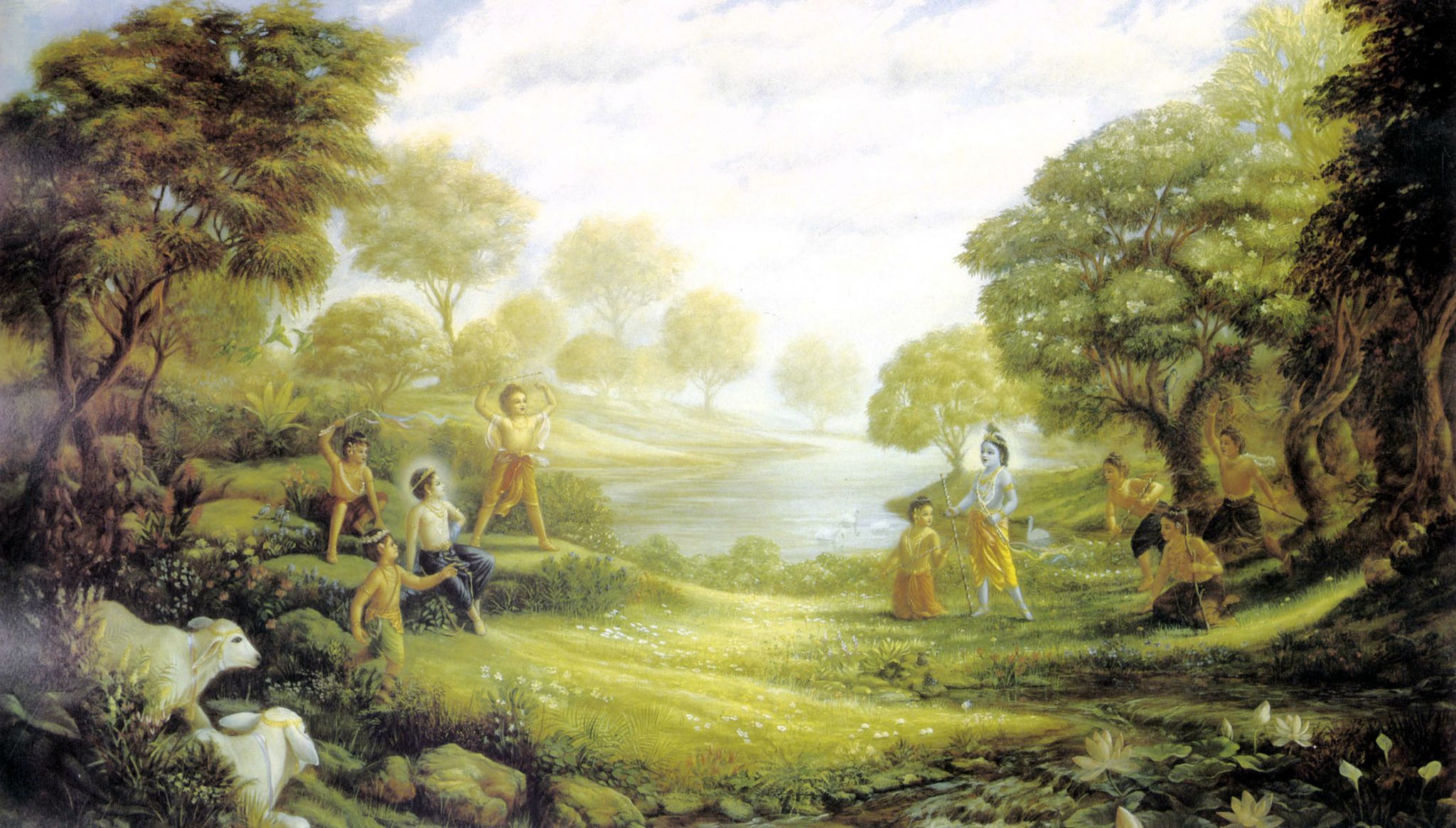 even more. But there is one hidden consideration here: Śrīdāmā is the brother of Śrīmatī Rādhikā. Therefore Kṛṣṇa is not always able to have free dealings with Śrīdāmā, because through him Rādhikā may come to know of something that Kṛṣṇa doesn’t want Her to know about. But with Subala, Kṛṣṇa can speak openly and freely and completely reveal His heart. Therefore there is no distance between Kṛṣṇa and Subala. In this way there are differences between sakhās, and Gopa-kumāra’s hankering is like that of Subala. He desires to serve Kṛṣṇa just as Subala does, remaining near to Him and taking the cows out to graze.
even more. But there is one hidden consideration here: Śrīdāmā is the brother of Śrīmatī Rādhikā. Therefore Kṛṣṇa is not always able to have free dealings with Śrīdāmā, because through him Rādhikā may come to know of something that Kṛṣṇa doesn’t want Her to know about. But with Subala, Kṛṣṇa can speak openly and freely and completely reveal His heart. Therefore there is no distance between Kṛṣṇa and Subala. In this way there are differences between sakhās, and Gopa-kumāra’s hankering is like that of Subala. He desires to serve Kṛṣṇa just as Subala does, remaining near to Him and taking the cows out to graze.
Suppose Kṛṣṇa is distributing a cintāmaṇi, a touchstone. Who is He distributing it to? To those who are qualified to receive it. And if someone else comes who is not qualified to receive a cintāmaṇi, what will Kṛṣṇa give to him? He will give him some other stone that may shine more than a cintāmaṇi, but which is not a cintāmaṇi. He will give the greatest thing only to those who have some special greed for it, and for this reason, He sent Nārada to Gopa-kumāra, saying, “Increase his greed.” But merely being greedy for a short time will not do. This greed is like a creeper: you must water it and protect it, and then it can grow all the way up to Vṛndāvana.
How does Kṛṣṇa increase someone’s greed? Once Nārada was chanting his mantra. After chanting more and 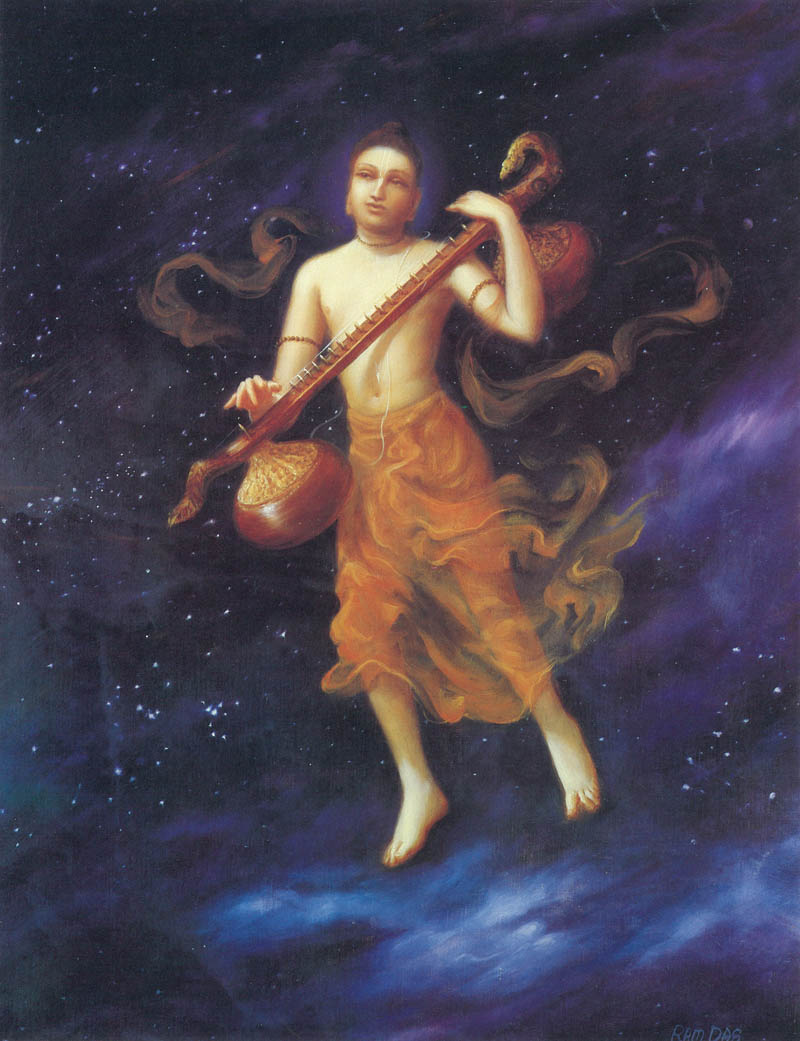 more, he attained svarūpa-siddhi. A very beautiful form with four arms appeared before him, and then at once disappeared. Now how much had his greed increased? Nārada started lamenting and crying until a voice from the sky said to him, “While residing within a material body you will not be able to have My direct company. For now you will remain in svarūpa-siddhi and you will not change your form. Then in your next birth, after giving up this form, you will attain vastu-siddhi and reside with Me eternally.”
more, he attained svarūpa-siddhi. A very beautiful form with four arms appeared before him, and then at once disappeared. Now how much had his greed increased? Nārada started lamenting and crying until a voice from the sky said to him, “While residing within a material body you will not be able to have My direct company. For now you will remain in svarūpa-siddhi and you will not change your form. Then in your next birth, after giving up this form, you will attain vastu-siddhi and reside with Me eternally.”
Therefore in sequence – first as the initiating spiritual master, then as the instructing spiritual master, then Bhagavān Himself comes as guru to increase our greed. So far the greed of Gopakumāra has reached up to Vaikuṇṭha, but now Nārada has come to increase his greed still further. As it increases more and more, finally Kṛṣṇa will give him the highest treasure, which is only given to someone who is fully greedy for it.
Prema-bhakti becomes mature in a similar way as a mango becomes ripe. There are many kinds of mango. Some mangos are so sweet, fragrant and delicious that upon tasting one of them, you won’t want to stop eating until it is finished. Again and again you will keep putting the mango to your mouth, and as long as there is a little juice remaining in it, you will not discard it. So where is prema found in its full maturity? In the company of the Vrajavāsīs. In the company of the nitya-siddha associates of Kṛṣṇa it will be fully mature, and nowhere else. So at that time in Vaikuṇṭha, Gopakumāra’s prema had not yet fully matured; it was still a little unripe.
Nārada is saying that there is no one capable of describing the nature of fully matured prema. Why? Because even Śrīmatī Rādhikā is not capable of it. In fact, if there is any person who is the most incapable of describing it, it is Rādhikā, because She Herself is fully immersed in that rasa. She will not be able to describe what She is experiencing, but those who remain aloof will be able to describe a little something of it. When a man has entered into rasa, what will he himself speak about it? He will not say anything. In any description of the state of Mahāprabhu’s prema, we don’t find in any place that He Himself described it. In some places Svarūpa Dāmodara has described it in poetry, Rūpa Gosvāmī described a little of it, and by hearing from Rūpa and Raghunātha, Kṛṣṇadāsa Kavirāja Gosvāmī described something of it, but he was unable to describe it completely.
Nārada is saying, “In describing this prema, what will I say? I am capable of saying something about the symptoms of it, but most people will misunderstand and take another meaning. I may say, ‘Oh, Rādhikā is dying in separation and crying in pain, the poor girl has become senseless! For a long time Rādhikā remained senseless. The tears from Her eyes made Her clothing wet, and She rubbed the dust of Kṛṣṇa’s feet on Her shawl and the rest of Her clothes. With the tears related to Kṛṣṇa and the dust related to Kṛṣṇa combined, Rādhikā’s clothes became unclean, but She refused to change them. She was firmly determined that She would wear no other clothes except those that were saturated with Her tears for Kṛṣṇa and His foot-dust.’ But upon hearing this, most people will say, ‘Oh, such suffering!’ ”
When Uddhava went to Vṛndāvana to deliver a message from Kṛṣṇa and first saw the condition of the Vrajavāsīs, he said, “I have heard that their love for Kṛṣṇa is very deep, but for so long they have been in so much agony! Mother Yaśodā is dying!” But will Rādhikā, Nanda Bābā or Mother Yaśodā ever leave Vṛndāvana? Will any gopī ever leave? Will even any of the young servants of the gopīs leave? No. They are experiencing a kind of ecstasy that even Uddhava could not fully understand. Therefore, even the servants who sweep Rādhikā’s home are considered to be on a higher level than Uddhava. Uddhava cannot attain that high kind of sentiment. The gopīs are all crying, and their servants are trying to console them, but still none of them will ever leave there. In the end Uddhava left Vṛndāvana unable to fully comprehend that high sentiment.
The symptoms of prema in its mature state are not a thing that can be spoken of, so how can it be written about in the scriptures? And if they were written, then what would be the result? In Śrīmad-Bhāgavatam only a little has been described about the meeting of Śrī Rādhā and Kṛṣṇa, and many people say that there is some detestable, sinful activity described in the Bhāgavatam. Many people have said this. How will all of these people understand the Bhāgavatam? Only a little has been told, and they say that it is filthy. So if even more of it were described, then what would happen? Yet if the Bhāgavatam were not there, the devotees would not be able to maintain their lives because the Bhāgavatam is most dear to them. If you give a piece of ginger to a monkey, what will he do? He will look at it, and then merely discard it. Monkeys do not know that ginger is valuable for digestion and health. So these high sentiments from the Bhāgavatam should not be described to ignorant people. They are not spoken even to Rukmiṇī or Satyabhāmā, so what to speak of others?
But there is one more point here: those who are rasika, who are sva-saṁvedya-daśā, who have experienced prema themselves – they will not describe it, but they will recognise it when they see it. Besides Svarūpa Dāmodara, no one else could understand the bhāva of Caitanya Mahāprabhu. He understood it, but never spoke of it. There is a verse that Mahāprabhu was calling out with a faltering voice before Jagannātha’s cart:
yaḥ kaumāra-haraḥ sa eva hi varas tā eva caitra-kṣapās
te conmīlita-mālatī-surabhayaḥ prauḍhāḥ kadambānilāḥ
sā caivāsmi tathāpi tatra surata-vyāpāra-līlā-vidhau
revā-rodhasi vetasī-taru-tale cetaḥ samutkaṇṭhate
Padyāvalī (382)
That same lover who stole away My heart during My youth is now again My master. These are the same moonlit nights in the month of Caitra, and the same breezes from the kadamba forest are blowing the same fragrance from the mālatī flowers. I am also the same lover as before, but My heart is not satisfied here. I desire to return with Him to the bank of the river Revā, under the vetasī tree.
When Mahāprabhu spoke that verse, only Svarūpa Dāmodara understood, but then it became apparent that Rūpa Gosvāmī also understood. Perceiving the sentiment within Mahāprabhu’s heart, Rūpa Gosvāmī composed a parallel verse. He wrote it on a palm leaf and placed it on the thatched roof of his hut before going to bathe:
priyaḥ so ‘yaṁ kṛṣṇaḥ saha-cari kuru-kṣetra-militas
tathāhaṁ sā rādhā tad idam ubhayoḥ saṅgama-sukham
tathāpy antaḥ-khelan-madhura-muralī-pañcama-juṣe
mano me kālindī-pulina-vipināya spṛhayati
Padyāvalī (383)
My dear friend, I have now again met My lover, Śrī Kṛṣṇa, here at Kurukṣetra. I am the same Rādhā, and We are experiencing the happiness of meeting. Still, I desire for Us to return to the bank of the Yamunā beneath the trees of the forest there, where I can hear Him playing the sweet melody of the fifth note on the flute.
Mahāprabhu and Svarūpa Dāmodara thought that only they could understand this sentiment, but upon seeing this poem of Rūpa Gosvāmī, they could see that Rūpa Gosvāmī also understood. This is sva-saṁvedya-daśā.
Therefore Nārada told Gopa-kumāra, “You are an eternal resident of Vraja, not of this Vaikuṇṭha. Now the mango is ripening; a little fragrance is coming from it. In a few days the mango will be fully mature, and its taster will see that it has ripened, its fragrance has come, and now juice will come out of it. So taking it, he will relish it. Such a day is coming. Now the time is very near when you will go to Vraja and all of your desires will be fulfilled.”
Source: Purebhakti.com
Image/Art made possible by Pixabay.com, Krishnapath.org and/or Bhaktiart.net
Unless indicated differently, all verse translations and quotes are from the books
by Śrīla Bhaktivedānta Svāmī Mahārāja Prabhupāda (Vedabase.com)

#Ultimately #Prema







